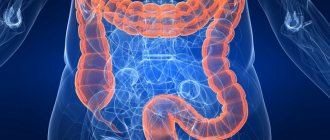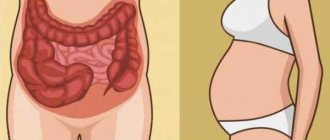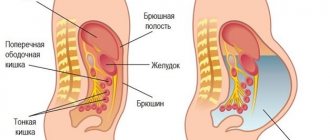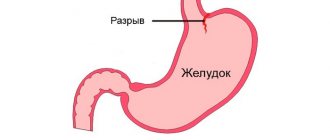What is bloating and gas?
Flatulence (or bloating and gas) is a medical term that describes the mechanism by which air is released from the digestive system through the anus.
Increased gas formation in the intestines is considered if the release of air occurs more than 25 times a day. The problem is dealt with by changing the diet and using medications.
In simple terms, this is a phenomenon in which excess gases and air accumulate in the intestines. When the abdomen fills with air or gas, the abdominal area may appear larger and more distended, and the abdomen may feel hard to the touch. The problem is considered common.
Bloating and accumulation of gases in the abdomen is a physiological process characteristic of every person. Flatulence can lead to discomfort and abdominal pain. There are many different methods to eliminate the problem, including folk recipes and various diets, but pills for bloating and gas are traditionally considered the most effective. The right medicine will relieve a person of an unpleasant symptom.
Symptoms of bloating
Excess gas in the digestive system is manifested by general discomfort and some unpleasant symptoms:
- pain and heaviness in different parts of the abdomen or throughout its entire area;
- loud sounds in the stomach, a feeling of constant movement in it;
- release of gas with an unpleasant odor, accompanied by loud sounds.
Sometimes there are complaints of frequent belching with an unpleasant aftertaste, heartburn, indigestion, sleep problems, and emotional instability.
Subjective sensations depend on the specific area of the digestive tract in which gases accumulate. If the delay occurs in the area of the splenic flexure, then the complaints are associated with pain in the left hypochondrium, radiating to the heart, and general bloating. Accumulation in the area under the liver is manifested by pain in the right hypochondrium and a feeling of fullness in the stomach.
Flatulence of the small intestine is characterized by general bloating of the abdomen, and of the large intestine - on the sides.
Causes of flatulence
Intestinal gas occurs when air accumulates inside the digestive system. This is a normal process.
Flatulence is regarded as a pathology that requires treatment in cases where the release of gases occurs more than 25 times a day - much more often than in the usual, regular manner.
What causes bloating:
- eating disorders;
- if you eat or drink too quickly;
- smoking;
- consumption of harmful foods,
- swallowing large amounts of air;
- bacteria;
- pathological conditions of the digestive canal.
Gas is collected as a result of two main mechanisms. The first involves swallowing excessive amounts of air while eating or drinking. This leads to the accumulation of oxygen and nitrogen in the gastrointestinal tract (esophagus, stomach, small intestine, large intestine).
With the second mechanism, digestive gases (hydrogen, methane, carbon dioxide) are formed during the digestion of food. Any of these methods leads to flatulence.
Predisposing factors that cause you to swallow more air than usual:
- chewing gum;
- smoking;
- sucking candy (lollipop);
- drinking carbonated drinks;
- high speed of food intake.
If a person often swallows more air than usual, then excessive gas formation will also be accompanied by belching. Chronic flatulence occurs.
The activity of some common bacteria found in the colon causes the destruction of hydrogen produced by other bacteria. The balance of the two types of bacteria explains why some people produce more gas than others. Most foods containing carbohydrates (bran bread, brown rice, peas, oatmeal, buckwheat porridge) can cause bloating. A diet rich in fats and proteins does not provoke the active formation of gases.
Bacterial overgrowth may occur in the small intestine. It is a condition in which there is an increase (or change) in the number of certain types of bacteria in the upper part of the gastrointestinal tract. This can lead to bloating, gas, and diarrhea. The condition is accompanied by intestinal motility disorders and is treated with antibiotics.
Diseases that cause bloating and gas
Other causes of bloating can be caused by medical conditions. These include:
- Irritable bowel syndrome (IBS, spastic colitis, mucous colitis);
- Inflammatory bowel disease, such as ulcerative colitis or Crohn's disease;
- Other functional gastrointestinal disorders (FGD);
- Heartburn;
- Food intolerance;
- Weight gain;
- Hormonal imbalance (especially for women);
- Giardiasis (a parasitic infection in the small intestine);
- Eating disorders (eating disorders) such as anorexia nervosa or bulimia nervosa;
- Mental factors such as stress, panic attacks, anxiety, depression and more;
The causes of bloating may be hidden in mental disorders. In cases where a state of anxiety or increased nervousness provokes a person to involuntarily swallow air (we recommend that the patient consult a psychologist).
- Some medications: non-steroidal anti-inflammatory drugs (Ibuprofen, Naproxen, Flurbiprofen, Ketoprofen);
- laxatives;
- antifungal drugs;
- varenicline (used to help people quit smoking).
Flatulence can also be a symptom of several serious conditions, including:
- Accumulation of abnormal fluid in the abdomen (ascites), resulting from cancer (eg, ovarian cancer), liver disease, kidney failure, or congestive heart failure;
- Celiac disease or gluten intolerance;
- Pancreatic insufficiency, which impairs digestion because the pancreas cannot produce enough digestive enzymes;
- Perforation of the gastrointestinal tract with gas release.
Causes of bloating
The human intestine produces gas every day, but most of it, about 70%, we absorb through air during meals. Every time we swallow food, 2-3 ml of air enters the stomach with it.
Normally, about 200 ml of gas is constantly present in the intestines of a healthy adult, and the total circulation per day is 20 or more liters. During the same time, from 200 ml to 2 liters of gas are released through the rectum.
The stomach already contains a certain amount of carbon dioxide, a product released during the reaction of hydrochloric acid with foods containing alkalis. Carbon dioxide is also formed in the duodenum when the components of pancreatic juice react with hydrochloric acid coming from the stomach.
Gases in the intestines are formed from several sources:
- gas released during fermentation and rotting of food;
- products of metabolic activity of bacteria formed during the fermentation process;
- gas coming from the circulatory system.
The air supplied with food combines with the gases in the digestive organs, forming foam from small bubbles. These bubbles are covered with slippery mucus, which allows gas to move freely towards the anus during peristalsis.
Organic substances that are not absorbed in the small intestine enter the large intestine. Their composition determines the smell of gas. The unpleasant odor of gases and feces is associated with the formation of hydrogen sulfide and ammonia during the breakdown of proteins. If the products of protein metabolism predominate over other components, the smell of rotting food appears. Plant fibers, cellulose and complex carbohydrates form a large volume of gas, which is dominated by odorless carbon dioxide.
The composition of the gas and its quantity in various segments of the digestive system are determined by the balance between the processes of formation and elimination. Bloating occurs when more gas accumulates in the intestines than the body can eliminate.
Causes of bloating of a physiological nature
All causes of bloating are divided into two large groups: periodic functional disorders that occur in healthy people under the influence of certain factors, and manifestations of various diseases of the digestive system. Common causes of bloating not associated with systemic diseases include:
- Improper eating behavior. Lack of diet, too much food eaten at one time, overeating at night, sedentary lifestyle, constant snacking on unhealthy foods.
- Switching to unusual food products, for example, when traveling to a country with specific culinary traditions. Bloating can also occur when switching to an unbalanced diet in order to lose weight. The cause of the painful condition is a lack of pancreatic enzymes necessary for digesting unfamiliar foods.
- Frequent consumption of foods that stimulate excessive gas formation, for example, kvass and black bread, which begin the fermentation process when they enter the intestines.
- Air travel. The so-called high-altitude flatulence is associated with the expansion of gases and an increase in their pressure on the digestive organs due to a decrease in atmospheric pressure at high altitudes.
- Hormonal changes during the menstrual cycle and pregnancy.
All these reasons do not imply pathologies of internal organs. They are periodic in nature and disappear after the elimination of the factors that caused the discomfort.
Flatulence is common in old age due to inevitable changes in intestinal physiology. Over time, atrophy of the intestinal muscle wall occurs and a decrease in the functionality of digestive juices. As a result, gases and undigested foods are retained in the intestinal lumen, causing flatulence.
Swallowing air
Flatulence caused by swallowing excess air while eating is called aerophagia.
Air swallowed while eating and drinking makes up more than half of the composition of intestinal gas. Swallowing air is associated with:
- quick food on the go,
- talking while eating,
- insufficient chewing and swallowing large pieces,
- smoking while eating,
- drinking carbonated drinks,
- drinking drinks through a straw.
A large volume of air enters the stomach when chewing gum constantly.
After eating in a hurry, part of the swallowed air comes out with belching, but the other part enters the gastrointestinal tract.
Another cause of aerophagia is poorly fitting dentures. A lot of air enters the stomach and with increased salivation, which occurs during neuroses and stress or as a result of certain diseases of the digestive system, for example, pancreatitis or stomach ulcers.
Diseases that cause bloating and gas
Almost all acute or chronic diseases of the digestive system can cause bloating, as they disrupt the processes of digestion and absorption of food and impair intestinal motility.
Most often, flatulence is one of the symptoms:
- inflammation due to colitis, gastritis, enteritis;
- irritable bowel syndrome;
- inflammation of the pancreas - pancreatitis;
- inflammation of the gallbladder and biliary tract - cholecystitis;
- tumors of the stomach and intestines of any etiology, adhesions, the presence of intestinal parasites (worms), etc.;
- acute appendicitis;
- poisoning causing intestinal motility disorders;
- lactose intolerance;
- gluten intolerance - a group of proteins found in cereals;
- neuroses and other diseases of the central nervous system.
An enlarged abdomen is not always associated with excess gas in the intestines. A big belly also appears with obesity. A person may feel quite satisfactory, but we must not forget that excess fat in the abdominal area disrupts the rate of metabolic processes and is a risk factor for the development of hypertension, diabetes and other serious pathologies.
Bloating almost always accompanies another functional disorder of the digestive system - irritable bowel syndrome. With this pathology, gastrointestinal diseases are not detected, and intestinal motility is impaired due to problems of a nervous or humoral nature.
The main symptom of irritable bowel disease is frequent abdominal pain and bowel movements. The stool can be either liquid or too hard, causing constipation. Flatulence accompanies both forms of the disorder. Gases in irritable bowel syndrome are formed due to changes in intestinal microflora and slower motility due to problems with reflex regulation.
A lack of digestive enzymes can occur due to inflammation of the pancreas. As a result, it is not the fermented lump that enters the large intestine, but unprocessed food. Under the influence of bacteria in the colon, food begins to decompose and ferment, producing a significant amount of gas.
A disease not related to the gastrointestinal tract, but causing bloating - ascites. This pathology is characterized by the accumulation of a large amount of fluid in the abdominal cavity. Ascites can be a symptom of severe infection, cirrhosis of the liver, heart and vascular problems, and portal vein thrombosis. This condition requires immediate medical attention.
Flatulence can also be an indirect sign of uterine fibroids, fibroids and ectopic pregnancy. Increasing in size, the uterus begins to squeeze the rectum, preventing the normal release of gases.
Lactose intolerance
Lactase deficiency is another common cause of bloating.
The essence of the pathology is the absence or insufficient activity of the lactase enzyme, whose task is to break down lactose (milk sugar) into glucose and galactose. Milk sugar, unlike glucose and galactose, does not have the ability to be absorbed into the blood and enters unchanged into the large intestine. There, bacteria break it down, and its disposal takes place with the release of a large volume of gas. The test for determining lactase deficiency using exhaled air analysis is based on the features of this process. Pathology is indicated by a high concentration of hydrogen in it. Another symptom of the disease is loose stools with foam and a characteristic sour odor due to increased secretion of water under the influence of undigested lactose.
Lactase deficiency occurs only when drinking whole milk. There is much less milk sugar in kefir, yogurt and other fermented milk products, and there is none at all in cheese and cottage cheese.
Representatives of some peoples at the genetic level cannot tolerate milk sugar, for example, the adult population of Africa. The gene for lactose tolerance is not formed among peoples who have been engaged in crop production rather than agriculture for a long time - the Japanese, Chinese and some other representatives of Asian countries.
Lactase deficiency is sometimes diagnosed in weak premature babies, but these cases are quite rare. Before transferring a newborn to lactose-free formulas, it is necessary to undergo a thorough examination. The situation becomes much more dangerous if the baby is intolerant to casein - the main milk protein, which is found in absolutely all dairy products, including cheese, cottage cheese and all fermented milk products. In this case, the child can be fed only with plant-based milk (Fig. 1), for example, soy milk, and introduced vegetable complementary foods and gluten-free cereals.
Figure 1. Almond and other plant milks do not contain lactose or the milk protein casein. Source: unsplash.com
Every third pregnant woman experiences bloating in the second or third trimester. Increased gas formation is accompanied by frequent belching, heartburn and problems with bowel movements. This may be due to the following factors:
- enlargement of the uterus and its pressure on the intestines;
- slower peristalsis due to hormonal changes;
- increased load on the liver and pancreas and insufficient production of digestive enzymes.
What foods cause bloating in adults?
Flatulence is caused by a large number of foods; this list is largely individual. Some people do not tolerate exotic fruits and unfamiliar cuisine well, while others experience bloating from foods traditional to our latitudes or combinations thereof. But most provoking foods are well known (Fig. 2); they are present in each group:
- Bread and pastries. Gas formation begins after eating products made from yeast dough, since yeast is a fungus that causes the fermentation process. Fresh white bread and baked goods are especially active in causing flatulence. Black bread also begins to actively ferment under the influence of gastric juice, which is why it is used in the production of kvass.
- Milk causes bloating, but fermented milk products, on the contrary, normalize the balance of intestinal microflora.
- Vegetables are the largest group of foods that cause bloating. Fermentation in the intestines is caused by all types of cabbage, especially white cabbage; legumes, especially beans and peas, remain undigested in the intestines for a long time and cause rapid proliferation of bacteria; fresh herbs, cucumbers, all types of radishes, tomatoes, potatoes.
- Fruits. Gas formation when eating fruits is associated with their high sugar content, which stimulates the fermentation process. A particularly active process is caused by grapes, pears, peaches and other juicy sweet fruits.
Other products worth noting are eggs, pork and lamb, and mushrooms. Bloating is caused by large amounts of slowly digested protein and coarse plant fibers. Active fermentation is also provoked by fast carbohydrates.
To prevent your favorite foods from causing flatulence, you can change the cooking method. For example, stewed cabbage does not stimulate gas formation. Cucumbers can be poured with vegetable oil, and legumes can be pre-soaked in water for several hours.
Neutral foods can also cause flatulence if consumed regularly. For example, rice and fish do not activate fermentation, but if you eat only sushi and rolls, constipation will begin very quickly, and with them the process of rotting with increased release of gases.
Figure 2. Foods that cause bloating. Source: MedPortal
Who is most likely to experience bloating?
Despite the fact that bloating in itself is not a disease and can periodically appear in completely healthy people, there are risk groups in which this condition appears very often:
- Overweight people - excess body weight increases the load on all body systems, including the digestive organs. In addition, excess weight usually appears in people with poor eating habits, who prefer fatty and sweet foods in excessive quantities.
- Smokers. Swallowing air occurs not only when smoking regular cigarettes, but also when using electronic gadgets and hookahs.
- Pregnant women due to an increase in the size of the uterus.
- People with chronic diseases of the digestive system, even during remission.
- People suffering from chronic bronchitis and pulmonary diseases. Problems with the bronchi and lungs can also provoke flatulence, since difficulty breathing is one of the reasons for swallowing air while eating.
20-30% of people suffer from bloating from time to time. This is a very common syndrome.
What foods cause bloating and gas in adults?
Choosing certain foods on a daily basis leads to excessive bloating. There are some substances that are difficult for the body to process (digest).
They pass from the small intestine to the large intestine without being fully prepared for the appropriate stage of evacuation.
The large intestine contains a large number of bacteria that break down food, releasing gases. Increased accumulation of these gases causes flatulence.
A diet high in the following foods will lead to flatulence:
- beans, beans, asparagus, lentils, peas;
- some vegetables (cabbage, broccoli, onions);
- corn;
- dried berries/fruits (raisins, prunes);
- wheat (in the presence of a disease such as celiac disease - intolerance to the protein contained not only in wheat, but also in rye and barley);
- pasta;
- oat bran (contains a lot of unrefined grain fiber);
- many fruits (peaches, apples, pears, apricots, melon).
These foods can also take a long time to digest. This leads to increased gas formation accompanied by an unpleasant odor. A diet high in fructose or sorbitol can also trigger the process by making it difficult for the digestive tract to process the sugar in its present form.
Pathological conditions
The reason why the stomach is constantly swollen may be pathological. It would seem that a person eats correctly, does not make mistakes and categorically refuses prohibited foods. However, symptoms such as rumbling, abdominal pain, and incessant flatulence do not even get better. Pathological causes of increased gas formation include:
- violation of digestive function (insufficiency of enzymes, bile);
- mechanical obstruction (adhesions, tumor processes);
- violation of the motor function of the digestive tract (dynamic gas formation);
- inflammatory processes (hepatitis, cirrhosis, gastritis, ulcers, Crohn's disease, colitis);
- vascular pathologies (thrombosis, varicose veins).
When a patient experiences increased flatulence and this condition persists for a long time, diseases such as:
- dysbacteriosis;
- helminthic infestations;
- intestinal infection;
- allergic reactions;
- gynecological pathologies.
Interesting! Features of using the medicine???? Drotaverine during pregnancy
It is possible to determine why the stomach is swollen and gases often pass away only after an examination. To do this, you need to contact a specialist.
Important! You cannot tolerate discomfort; if there is pathology, it will not disappear on its own, but will only increase.
How to treat flatulence and bloating
There are a number of ways to treat flatulence. The choice of method depends on the main reasons for the formation of gases in the intestines.
Periodic increases in gas formation that occur after consuming a certain category of foods can be eliminated by adjusting the diet. A healthy person can do without special pharmacological agents. The violation will pass quickly.
Sometimes the patient has unexplained flatulence. The person also suffers from other symptoms along with the bloating (for example, constipation or abdominal pain). In such situations, it is imperative to seek specialized medical help.
Prolonged flatulence is a symptom of diseases of the digestive canal. The doctor will conduct a correct examination and find out the origin of the causes of gas in the intestines (diagnosis of the underlying disease).
Drug treatment for excessive gas may include:
- drug treatment;
- change of diet.
Which drug to choose for flatulence:
When you often suffer from bloating, it is better to leave the choice of medication to a specialist (gastroenterologist, therapist). Because there are many reasons for increased gas formation, and some of them are completely unsafe.
Getting rid of gases and bloating is possible only with an integrated approach to the treatment of the main pathology. For example, bloating caused by overeating is relieved with carminatives, and in case of microflora imbalance, with probiotics.
Definition of the concept
Scientifically, the problem is called flatulence. The word has Greek roots and means “lifting up.” This is an excessive accumulation of gas in the gastrointestinal tract due to its increased formation and/or difficult elimination process. It can be manifested by belching, heaviness and pain in the abdomen, bloating, rumbling and increased release of intestinal gases.
Normally, 0.5-1.5 liters of a gas mixture accumulates in a person’s stomach and intestines per day, which is released with belching, as well as through the intestines in 10-15 passages. The composition of this mixture is varied: nitrogen (up to 92%), oxygen, hydrogen sulfide, carbon dioxide, hydrogen, methane, indole and skatole (gives an unpleasant odor). There are two sources of gas formation:
- • External (up to 70%) – when swallowing air. Typically, 3 ml of air is swallowed per swallowing movement. If you talk while eating or eat quickly, its amount increases. Consumption of soda, beer, kvass, chewing gum, as well as increased salivation increase the flow of gases into the stomach from outside.
- • Internal - as a result of the work of intestinal microorganisms and the diffusion of gases from the blood into the intestinal lumen.
In the stomach, the incoming gas is located at its bottom (closer to the exit to the esophagus). In the intestinal lumen, it forms many small bubbles (in the form of foam), covered with a layer of mucus. Normally, part of it is absorbed by the intestinal wall. If for some reason the properties of mucus change, the absorption of gases may be impaired and they will begin to accumulate in excess.
Medicines for bloating and intestines
In pharmacies there are various anti-flatulence tablets that can instantly cope with bloating. You can buy cheap and more expensive drugs for bloating and intestinal bloating. But for most people, inexpensive cost, quality of the product, and confidence that the product is effective are the main factors when choosing a medicine.
The main group of drugs for increased gas formation and bloating are:
- enterosorbents (Lactofiltrum, Activated carbon, Diosmectite, etc.);
- prokinetics (Motilium, Itomed, Cerucal);
- enzyme preparations (Mezim, Festal, Pancreatin, etc.);
- antispasmodics (Drotaverine, Spasmonet, Mebeverine);
- probiotics (Hilak-forte, Lactobacterin, Enterol);
- antifoam or carminative drugs (Espumizan, Pepsan, Maalox plus, etc.).
They help break down gases and toxins, as well as remove them from the digestive system naturally.
Enterosorbents
This group of drugs is considered inexpensive and accessible to everyone. Enterosorbents are products that connect and remove harmful substances (cholesterol, toxins, pathogens) from the human body. They help eliminate gases well. They have a wide range of effects and are completely eliminated from the body.
Specifics of enterosorbents:
- carbon - products that reproduce various combinations of activated carbon;
- silicon – help remove toxins and cleanse the body;
- organic – created on the basis of natural fibers, such as cellulose, chitin, etc.
However, this group is not suitable for long-term use, since along with harmful substances, beneficial substances (enzymes, vitamins) can also be released and lead to constipation.
Description of some products included in the group of enterosorbents:
- Activated carbon . This is the cheapest and most accessible drug that saves you from food and household (poisons, gases) poisoning. Be careful when consuming charcoal with other medications. The dosage is calculated as follows - 1 tablet. per 10 kg body weight. Should be taken 1 hour before meals or 2 hours after meals, including taking medications. Contraindications are ulcerative pathologies of the gastrointestinal tract and hemorrhages in the digestive organs. It is not allowed to use activated carbon for more than 7 days, because... the formation of mechanical damage to the mucous membranes is possible.
- Polysorb . Based on Silicon Dioxide, produced in powder form to make a suspension. The product has an antibacterial astringent effect and removes harmful substances from the body. Indications for use: gas formation in the intestines caused by food poisoning. You should not use Polysorb if you have individual intolerance, stomach ulcers, or intestinal atony.
- Smecta . Effective in the fight against flatulence. It favorably promotes the functioning of the digestive system, eliminates gases, and normalizes gastric peristalsis. Available in powder form. The drug is suitable for the treatment of adults, children and even pregnant women. The composition contains natural ingredients that quickly remove pathogenic bacteria, viruses, waste, and toxins. Contraindications are the body's instability of fructose, lack of sucrose, obstruction, and allergies to some of its components. In general, the medicine is well tolerated and rarely causes side effects or complications.
- Lactofiltrum . Produced in tablet form, powder, lozenges. In addition to cleansing negative substances, lactulose (included in the composition) increases the growth of beneficial microorganisms in the intestines, and can also improve immunity. Side effects include constipation, diarrhea, and allergies. You cannot take medicine for bloating if you have ulcerative pathology, obstruction, individual intolerance, or bleeding from the gastrointestinal tract.
These are not all means; there are other equally effective enterosorbents.
Prokinetics
For gas formation and other digestive disorders, medications are used that can have a beneficial effect on the performance of the intestines and stomach, restoring peristalsis.
The most common anti-bloating remedies:
- Motilium . The active component is Domperidone, it belongs to the 1st generation, it has no severe side effects. The medicine stimulates the intestines to work, while helping to get rid of the problem. Available in the form of tablets, syrup, and tablets. Motilium copes with flatulence, nausea, heaviness in the stomach. It is not recommended for use in case of hemorrhages in the gastrointestinal tract or personal intolerance. Do not use together with antifungal drugs (Fluconazole, Nystatin).
- Ganaton (Itomed) . These anti-bloating pills quickly relieve discomfort, stomach pain, heartburn, vomiting, and anorexia. Method of administration – 1 tablet. three times a day before eating. Possible side effects: diarrhea, constipation, headaches, abdominal pain, increased salivation, allergies. Restrictions include pregnancy, children under 16 years of age, intolerance to components, and gastrointestinal hemorrhages.
- Domperidone . Designed to eliminate bloating, diarrhea, and heaviness. Negative consequences include allergies, intestinal spasms, and disorders of the nervous system. Cannot be used during lactation, pregnant women, children under 5 years of age, prolactinoma.
Also effective are Motilak, Passazhiks, Trimedat, etc. They have an antiemetic effect.
Enzymes
This group is used when bloating or discomfort is caused by a disorder of the digestive process due to a lack of enzymes.
Diagnosis and elimination
If a patient consults a doctor and tells him that his stomach is often swollen, the specialist will prescribe a number of diagnostic measures, including:
- survey and external inspection;
- laboratory diagnostics;
- instrumental studies.
The results obtained will help you find out about the cause of flatulence, according to which specific treatment will be prescribed.
Carminatives
When the stomach is bloated, safe and accessible defoamers come to the rescue. Carminatives are not absorbed into the bloodstream. Their action occurs only in the intestines. The drugs break up gas bubbles, and then remove them from the intestines naturally. This does not create additional discomfort for the patient. The release of gas occurs without pain. Carminatives are sold in pharmacies without a prescription:
- Espumisan – breaks up gases and normalizes intestinal function;
- Pepfiz - carminative tablets combined with digestive enzymes;
- Azulan - eliminates gas formation and relaxes smooth muscles.
For young children, the following drugs are used: Sab Simplex, Bobotik, Baby Calm, Plantex.
Important! Increased gas production in children in the first months of life is the norm, but parents should still consult a pediatrician.
Enterosorbents and antiseptics
Diagnostic tests can show the presence of pathogenic bacteria in the intestines. For this reason, the stomach is swollen; a specialist will tell you what to do and what medications to take. The doctor will prescribe sorbents to remove toxins released by microbes:
- Activated carbon is a well-known and inexpensive remedy;
- Polysorb is a drug available for use for all age groups of patients;
- Enterosgel is a sweet gel-like substance.
Also, intestinal antibiotics are prescribed to eliminate bacterial flora:
- Enterofuril;
- Stopdiar;
- Ecofuril.
Interesting! Nutrition for intestinal colitis and flatulence - what to eat
If helminthic infestations are detected, broad-spectrum anthelmintic drugs are prescribed.
Microflora restorers
The fight against bloating is completed with a course of probiotics and prebiotics. The missing beneficial bacteria are determined through laboratory tests. For replenishment, probiotic drugs are prescribed:
- Maxilac;
- Acipol;
- Lactobacterin.
In order to maintain the vital activity of beneficial microorganisms, prebiotics, for example, lactulose-based preparations, are recommended.
Diet (diet for bloating)
Doctors advise the patient to keep a food diary and change dietary habits to reduce the number of cases of gas accumulation in the intestines. The causes and prerequisites for flatulence, depending on their specificity, can be effectively identified and eliminated using the services of a nutritionist. Establishing nutrition and food consumption includes:
| Step | Action and purpose | Result |
| Pay attention to your diet. | Eliminating inappropriate foods. Limiting fats. Replacing carbohydrates that are difficult to digest with those that do not require much effort for the digestive canal to absorb. | The digestive tract is not strained. No excess air is formed in the intestines. |
Including healthy foods that reduce gas formation in your diet:
| The passage of air in the intestines is facilitated. There are no prerequisites for its accumulation. | |
| Avoid eating food quickly. | You should try to chew food slowly, thoroughly grinding with your teeth. | Sufficiently mechanically processed food is absorbed well. |
| Don't overeat. | Overeating contributes not only to obesity, but also to flatulence. You can try to organize about 5-6 small meals a day instead of three large ones. | Optimization of the digestive process has been achieved. The stomach empties faster, allowing gases to move freely into the small intestine. |
Additional clarity should be provided regarding the gas-reducing products listed in the table:
- A small amount of ginger will help combat difficult digestion or indigestion (dyspepsia) that causes gas. Pregnant women will need to consult a doctor before consuming ginger.
- Honey is not intended for the diet of children under one year of age and persons with a predisposition to allergic reactions.
- Replacing your regular tea, soda, and coffee with peppermint tea throughout the day can help reduce bloating symptoms.
- People react differently to certain foods. Therefore, the foods listed above may still cause gas.
If the methods don't work, then a more rigorous approach will need to be taken. You need to start by eating a very limited amount of safe foods that are easily digested by the body. You can then gradually try adding new foods every 48 hours to determine which food or food group is causing the difficulty.
You can get rid of the problem with flatulence only after its main causes have been established and the products that cause excessive gas formation have been identified. Then the person will learn to avoid consuming unsuitable foods.
Associated symptoms
With flatulence caused by indigestion, a person may experience nausea after eating.
Gastric flatulence, caused by a functional disorder of the digestive organs, is often accompanied by other uncomfortable conditions. After eating, a bursting, painful sensation appears in the stomach area; a person is bothered by a burning sensation in the esophagus, nausea, and sometimes vomiting. If liver damage is observed, in addition to the stomach swelling, the patient is bothered by bitterness in the mouth, weakness, and the skin becomes gray-yellow. During menopause, a bloated belly indicates a hormonal imbalance. An increase or decrease in estrogen levels causes fluid retention in the body and increased gas production.
In pregnant women, stomach discomfort and bloating are often observed after eating. In addition to the fact that a woman becomes bloated, she may experience an upset stomach or, conversely, constipation. In this situation, no special treatment is required. It is important to eat properly and avoid foods that cause excessive gas in the intestines.
Treatment of bloating with folk remedies
Here is a volume of the most effective remedies for treating flatulence with folk remedies (also check out the video below):
- Fennel Seeds – Fennel seeds are very effective for bloating problems due to its diuretic, analgesic and antimicrobial properties. Fennel seeds can help relieve bloating by relaxing muscle spasms in the digestive tract. Chew a few fennel seeds after a heavy dinner.
- Add one teaspoon of seeds to 1 cup of hot water. Cover with a lid and let it cool for 5-10 minutes. Strain and drink this tea 2-3 times a day.
- Place 5-6 thin slices of ginger in a cup and pour boiling water over it. Cover the cup and let it sit for about 10 minutes. Add a little more honey and lemon juice and take this drink 3 times a day.
- Boil a kettle and pour water into a cup with one chamomile tea bag. Cover with a lid and let stand for 10 minutes.
- If you suffer from frequent bloating, chew a piece of cumin several times throughout the day.
Principles of treatment
- 1. Elimination of the causative disease (condition) or its correction.
The doctor will prescribe medications depending on the situation.
- 2. Dietary recommendations:
- · Eliminate or reduce the consumption of gas-forming products: cabbage, sorrel, grapes, all legumes, beer, kvass, raw vegetables and fruits, sweets.
- · Include fermented milk products, porridge (buckwheat, rice, millet), boiled meat, boiled vegetables, baked fruits in your diet.
- · Diet culture: leisurely eating, chewing thoroughly, reducing talking while eating, avoiding chewing gum.
- 3. Drug therapy.
- • Sorbents (Activated carbon, Smecta, Polysorb, Enterosgel, etc.) – adsorb gases, toxins, bacteria on their surface and reduce bloating. The action is non-specific, they also absorb nutrients and vitamins and contribute to the development of constipation. Long-term use is not recommended.
- • Prokinetics (Domperidone, also known as Motilium) – used for decreased peristalsis. Act on the upper parts of the digestive tract. The antiemetic drug Cerucal also has prokinetic properties.
- • Antispasmodics (Drotaverine, Papaverine) - aimed at relieving spasms and the pain caused by them. They act only on smooth muscles (stomach, intestines, uterus).
- • Defoamers (Simethicone, Espumisan, Bobotik) – change the surface tension of gas bubbles, destroying them, covering the wall of the digestive tract with a protective film.
- • Enzyme preparations (Pancreatin, Creon, Festal) are prescribed as replacement therapy for insufficient pancreatic function. It can be taken once in case of overeating fatty foods, for example, during a feast.
- • Bile preparations (Ursosan, Ursofalk, etc.) are used for cholelithiasis, biliary dyskinesia and other pathological conditions. Depending on the type, they increase the secretion and excretion of bile into the duodenum.
- • Medicines that improve the composition of normal intestinal flora.
- –Probiotics are the general name for preparations of live bacteria (Linex, Bifidumbacterin, Lactobacterin).
- – Prebiotics do not contain microorganisms; they are a food substrate for the growth of their own flora (Hilak forte, Laktofiltrum).
- • Intestinal antiseptics are prescribed in case of infection and bacterial overgrowth syndrome.
- 4. Herbal medicine for pain and bloating.
- • Dill infusion. Grind a tablespoon of seeds, pour a glass of boiling water and let it brew for 30 minutes. Take half a glass a couple of hours before meals. The pharmacy has a ready-made preparation “Dill Water”, as well as herbal tea “Dill Water”.
- • Chamomile flowers. Good antispasmodic effect. Prepare an infusion: pour a tablespoon of dry herb or a filter bag with a glass of boiling water and leave for 15 minutes. Take 100 ml 30 minutes before meals.
- • Melissa decoction. Its essential oils relieve spasms well and have a mild sedative effect. To prepare, you will need 4 tablespoons of herbs and half a liter of boiling water. Leave to stand for 40 minutes. Take a quarter glass before meals 3 times a day.
- • St. John's wort, yarrow, anise seeds, caraway seeds, rowan fruits, valerian and licorice roots, and lavender have a positive effect. You can use ready-made pharmaceutical herbal preparations.
- 5. Physical therapy. Bloating and heaviness in the abdomen can be reduced with exercise, if physical activity is not contraindicated for you.
- • Strengthen your abdominal muscles regularly.
- • If your stomach is swollen, lie on your back and alternately grasp your left and right knee. You can try touching it with the tip of your nose. Repeat on each leg 10-15 times.
- • Diaphragmatic breathing or drum-pit exercise. Breathe deeply with your “belly” - slowly inhale through your nose (belly-drum) and exhale through your mouth (belly-pit). 5 repetitions are enough, otherwise you may feel dizzy.
- • If severe bloating bothers you and you don't feel like exercising, just lie on your stomach for a few minutes. Changes in intra-abdominal pressure promote the release of gases.
How to prevent increased stomach gas in the future
In many cases, symptoms of bloating can be prevented through lifestyle changes. To prevent yourself from swallowing too much air, you can:
- Avoid chewing gum. Stop chewing gum; chewing gum can cause you to swallow air and cause bloating.
- Limit your consumption of carbonated drinks.
- Eat slowly and do not drink through a straw.
- Consume lactose-free dairy products (if you suffer from lactose intolerance).
Flatulence is not a disease; it is a phenomenon characteristic of healthy people. Bloating, caused by the accumulation of gases, leads to an enlargement of the abdomen, pain, and the release of gases to the outside.
Excessive gas formation causes discomfort to a person. The most effective, helping to quickly get rid of it are drugs against flatulence, which can adsorb gas, reduce its appearance by normalizing digestion and restoring microflora.
However, drug therapy must be agreed upon with the attending physician, since the cause of bloating must be disclosed before prescribing them.
Causes of gas formation in the intestines
Excessive gas production does not always mean taking medications, because this phenomenon can have several causes:
- Excessive swallowing of air while eating, drinking, smoking or talking. By the way, this process is especially typical for cases when a person drinks drinks through a straw or chews chewing gum too intensively.
- Eating large amounts of carbohydrates and a number of foods that cause increased gas formation. And first of all, these are eggs, sweets, all legumes, cereals and cruciferous vegetables.
- Lactose intolerance. There are people who cannot digest milk sugar, which means that undigested lactose is an excellent food for bacteria that produce gases. The problem affects 30% of the world's population.
- Taking medications that cause changes in the qualitative and quantitative composition of microflora. First of all, these are antibiotics, antidepressants, drugs with a high calcium content, as well as drugs used in hormonal therapy.
- Diseases of the nervous system, prolonged depression and mental trauma.
- The presence of parasites in the digestive tract, resulting in intestinal obstruction, and the gases that accumulate due to this cause flatulence.
- Chronic diseases of the digestive system, and the process of increased gas formation may be accompanied by dysbacteriosis or constipation.
- Climax. Flatulence is a problem for 70% of women who have crossed all imaginable limits. According to doctors, such changes occur due to a decrease in hormone levels, but it is still unclear who is “to blame” for this - progesterone or estrogen.
- Surgical operations. The problem occurs after surgical intervention in all organs of the biliary or digestive system. Flatulence is inevitable after removal of the gallbladder, as well as other unpleasant symptoms (pain in the right hypochondrium, nausea, diarrhea, etc.).










